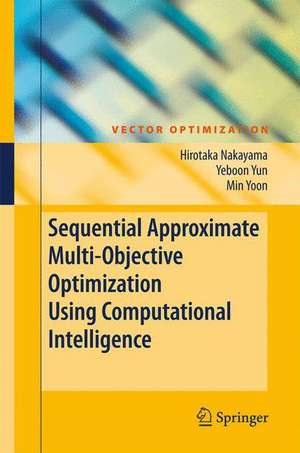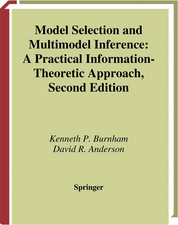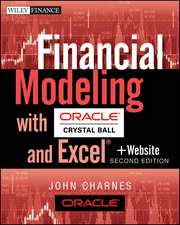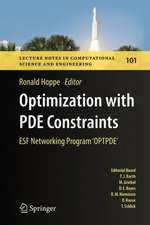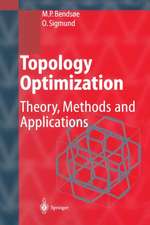Sequential Approximate Multiobjective Optimization Using Computational Intelligence: Vector Optimization
Autor Hirotaka Nakayama, Yeboon Yun, Min Yoonen Limba Engleză Hardback – 12 mai 2009
| Toate formatele și edițiile | Preț | Express |
|---|---|---|
| Paperback (1) | 940.72 lei 6-8 săpt. | |
| Springer Berlin, Heidelberg – apr 2011 | 940.72 lei 6-8 săpt. | |
| Hardback (1) | 947.35 lei 6-8 săpt. | |
| Springer Berlin, Heidelberg – 12 mai 2009 | 947.35 lei 6-8 săpt. |
Preț: 947.35 lei
Preț vechi: 1155.30 lei
-18% Nou
Puncte Express: 1421
Preț estimativ în valută:
181.27€ • 189.26$ • 150.03£
181.27€ • 189.26$ • 150.03£
Carte tipărită la comandă
Livrare economică 04-18 aprilie
Preluare comenzi: 021 569.72.76
Specificații
ISBN-13: 9783540889090
ISBN-10: 3540889094
Pagini: 300
Ilustrații: XVI, 200 p. 111 illus.
Dimensiuni: 155 x 235 x 16 mm
Greutate: 0.5 kg
Ediția:2009
Editura: Springer Berlin, Heidelberg
Colecția Springer
Seria Vector Optimization
Locul publicării:Berlin, Heidelberg, Germany
ISBN-10: 3540889094
Pagini: 300
Ilustrații: XVI, 200 p. 111 illus.
Dimensiuni: 155 x 235 x 16 mm
Greutate: 0.5 kg
Ediția:2009
Editura: Springer Berlin, Heidelberg
Colecția Springer
Seria Vector Optimization
Locul publicării:Berlin, Heidelberg, Germany
Public țintă
ResearchCuprins
Basic Concepts of Multi-objective Optimization.- Interactive Programming Methods for Multi-objective Optimization.- Generation of Pareto Frontier by Genetic Algorithms.- Multi-objective Optimization and Computational Intelligence.- Sequential Approximate Optimization.- Combining Aspiration Level Approach and SAMO.- Engineering Applications.
Recenzii
From the reviews:
"The basic concepts of multiobjective optimization are included making the book self-contained. The performance of the presented methods is demonstrated by the results of applications to real world problems. … The book is aimed to researchers, practitioners in industries and students of graduate course and high grade of undergraduate course." (Antanas Žilinskas, Zentralblatt MATH, Vol. 1167, 2009)
"The basic concepts of multiobjective optimization are included making the book self-contained. The performance of the presented methods is demonstrated by the results of applications to real world problems. … The book is aimed to researchers, practitioners in industries and students of graduate course and high grade of undergraduate course." (Antanas Žilinskas, Zentralblatt MATH, Vol. 1167, 2009)
Textul de pe ultima copertă
This book highlights a new direction of multiobjective optimzation, which has never been treated in previous publications. When the function form of objective functions is not known explicitly as encountered in many practical problems, sequential approximate optimization based on metamodels is an effective tool from a practical viewpoint. Several sophisticated methods for sequential approximate multiobjective optimization using computational intelligence are introduced along with real applications, mainly engineering problems, in this book.
Caracteristici
No book on the subject so far Since no explicit functions form of objectives is available in many practical ( in particular, engineering design) problems, optimization using metamodels is very important in practice Book is also a good application of computational intelligence techniques Includes supplementary material: sn.pub/extras
